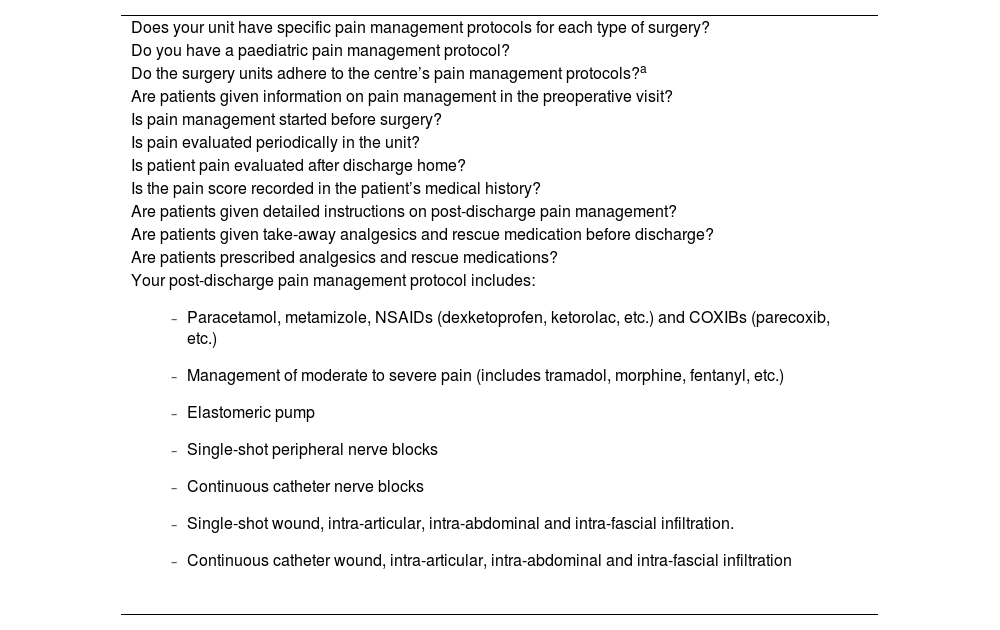Adequate treatment of acute postoperative pain is one of the quality requirements in ambulatory surgery and its suboptimal management is associated with delayed discharge, unplanned admissions and late admissions after home discharge. The aim of the present study was to learn about the organizational strategy for the management of postoperative pain in ambulatory surgery units (ASU) in Spain.
MethodsA cross-sectional, multicenter study was carried out based on an electronic survey on aspects related to the management of acute postoperative pain in different ASUs in our country.
ResultsWe recruited 133 ASUs of which 85 responded to the questions on the management of postoperative pain. Of the ASUs that responded, 80% had specific protocols for pain management and 37.6% provided preoperative information on the analgesic plan. The assessment of postoperative pain is carried out in 88.2% of the ASUs in the facility and only 56.5% at home. All ASUs use multimodal analgesia protocols; however, 68.2% report the use of opioids for the treatment of moderate to severe pain. Home invasive analgesia strategies are minimally used by the surveyed ASUs.
ConclusionsThe DUCMA study highlights that the practice of pain treatment in day surgery remains a challenge in our country and is not always in agreement with national guidelines. The results suggest the need to establish strategies to improve clinical practice and homogenize pain management in ambulatory surgery.
El tratamiento adecuado del dolor agudo postoperatorio (DAP) es uno de los requisitos de calidad en cirugía mayor ambulatoria (CMA) y su manejo subóptimo se asocia con retrasos en el alta, ingresos no previstos y reingresos tras el alta domiciliaria. El objetivo del presente estudio fue conocer la estrategia organizativa del manejo del DAP en las unidades de CMA de España.
MétodosSe realizó un estudio transversal, multicéntrico basado en una encuesta electrónica sobre aspectos relacionados con el manejo del DAP en diferentes unidades de CMA de nuestro país.
ResultadosSe reclutaron 133 UCMAs de las cuales 85 respondieron a las preguntas sobre el manejo del DAP. De las unidades que respondieron, el 80% dispone de protocolos específicos para el tratamiento del dolor y el 37,6% realiza información preoperatoria del plan analgésico. La valoración del DAP lo realizan el 88,2% de las UCMAS en la unidad y en domicilio sólo el 56,5%. El 100% de las unidades utiliza protocolos de analgesia multimodal, sin embargo, el 68,2% refiere la utilización de opioides para el tratamiento del dolor moderado-intenso. Las estrategias de analgesia invasiva domiciliaria son mínimamente utilizadas por la unidades encuestadas.
ConclusionesEl estudio DUCMA pone de manifiesto que la práctica del tratamiento del DAP en CMA sigue siendo un reto en nuestra país y que no siempre está en consonancia con las directrices nacionales. Los resultados sugieren la necesidad de establecer estrategias para mejorar la práctica clínica y homogeneizar el tratamiento de dolor en la CMA.










